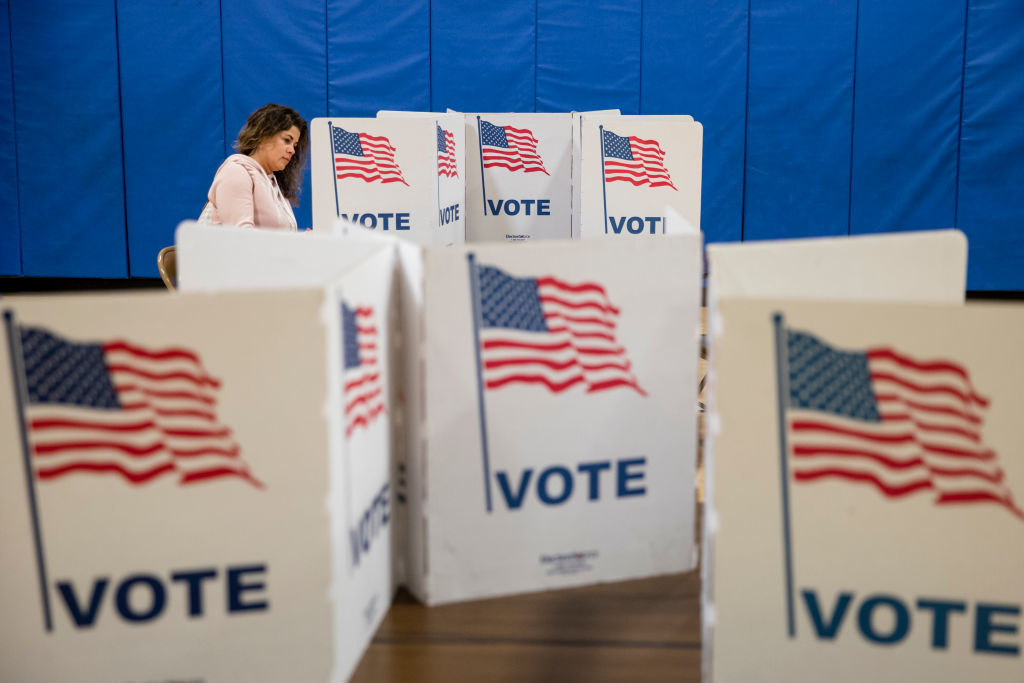The women, peace and security update
Posted By
Tracy Beattie, Hal Crichton-Standish, Daria Impiombato, Alexandra Pascoe and Albert Zhang
on November 10, 2020 @ 12:57
 Scoring the US on WPS
Scoring the US on WPS
The Georgetown Institute for Women, Peace and Security
has published an index evaluating the status of women’s rights, opportunities and wellbeing across the US. The results show great differences among the states, with Massachusetts ranked as the best state for women and Louisiana as the worst. Measures were grouped under the categories of inclusion, justice and security, and the study considered indicators such as women’s employment, community safety and legal protection. As the US election drew to a close, observers
noted a correlation between each state’s political leaning and its WPS score, with Republican states scoring lower than Democratic states.
Russia’s failed bid to wind back women’s rights in conflict zones
Russia has
failed in its attempt to introduce a UN Security Council resolution that would have eroded women’s rights in conflict zones. The proposed resolution was viewed as an effort to
water down ‘commitments on human rights, prevention of conflict-related sexual violence, and women’s equal participation in peace negotiations’. China, South Africa, Vietnam and Indonesia voted with Russia in support of the resolution; however, the US, the UK, Germany and France abstained, preventing it from passing. Key reasons for the failure of Russia’s initiative included its
inability to accept proposals from other UN member states that emphasised rights-based aspects and supported the WPS agenda.
Twentieth anniversary of resolution 1325
The 31st of October marked two decades since the
unanimous UN Security Council decision to formally acknowledge the role of women in securing and maintaining peace.
Resolution 1325 recognised that conflict affects women and girls differently from men and boys, and that equal representation of women in peace and security leadership creates more sustainable outcomes. The UN Security Council held an
open debate on 29 October to mark the occasion. In a briefing before the debate, Secretary-General Antonio Guterres
concluded firmly by saying, ‘We cannot wait another twenty years to implement the women, peace and security agenda’. Since 2000,
nine supporting resolutions have been passed and
86 countries have implemented
national plans and legislation. While this landmark agenda has elevated female leadership and participation, some analysts have
argued that a broader and more inclusive approach is required if the agenda is to be fully realised.
WPS at 20: Where to next?
To commemorate the anniversary of resolution 1325, the International Peace Institute’s (IPI’s)
Global Observatory has been running a
series of articles on different aspects of the WPS agenda. Some of the topics covered are the ‘distinct yet complementary aims’ of the WPS agenda and the
youth, peace and security agenda, the inclusion of
race and other identities in implementation of the WPS agenda, and the
intersection of the WPS agenda with measures to address climate change and other disasters.
A contribution from IPI researcher Jasmine Jaghab looks at the
disproportionate economic impact of the Covid-19 pandemic on women. The article focuses on how the competing demands of paid and unpaid labour are forcing women to make difficult decisions, and that many are deciding to leave the workforce. Jaghab argues that mitigation measures will be needed to prevent the pandemic from exacerbating inequalities, including universal childcare and increased investment in education.
An
interview with US feminist theorist and professor Cynthia Enloe similarly touches on the need for gender-based Covid-19 responses. In a segment on
domestic violence, Enloe highlights the importance of avoiding public health policies that are based on the assumption that ‘home’ is an equally safe space for women and men. She also talks about people’s tendency to rely on and trust the expertise of men in
the scientific field.
Applying a gender lens to countering violent extremism
Analysis from IPI researcher Phoebe Donnelly
revisits persistent issues in national and international policies on countering violent extremism that could be harmful for women. Most CVE programs still refer to women solely in the context of their relationship to men. This undermines women’s agency, reinforces narratives that portray women as victims, and entrenches the notion that women are only useful because of their influence over male family members. Donnelly stresses that women should be recognised for their wider roles in community leadership, activism, civil society and the electoral process, highlighting the importance of working towards more complex, gender-sensitive and data-driven approaches.
Navigating future challenges
The WPS agenda is ever-evolving, and so are the challenges it faces. In a
piece for the London School of Economics, Soumita Basu, Paul Kirby and Laura Shepherd look at upcoming challenges the WPS agenda will encounter, which include climate change, global health, migration, human trafficking and violent extremism. These challenges can have severe
gendered effects that are further exacerbated by the lack of funds, resources and programs. It’s important, therefore, to understand the ‘intersecting dynamics of oppression and inequality’ and work harder to ensure diverse perspectives are included in the WPS agenda.
Tracy Beattie, Hal Crichton-Standish, Daria Impiombato, Alexandra Pascoe and Albert Zhang are research interns at ASPI. Image: Samuel Corum/Getty Images.
Article printed from The Strategist: https://www.aspistrategist.org.au
URL to article: https://www.aspistrategist.org.au/the-women-peace-and-security-update-10/
[1] has published: https://giwps.georgetown.edu/wp-content/uploads/2020/10/The-Best-and-Worst-States-to-Be-a-Woman.pdf
[2] noted: https://blogs.prio.org/2020/11/womens-well-being-and-the-us-election/
[3] failed: https://www.theguardian.com/global-development/2020/oct/30/russia-loses-un-vote-over-womens-rights-in-conflict-zones
[4] water down: https://www.theguardian.com/global-development/2020/oct/29/russia-makes-bid-to-water-down-un-commitments-on-female-peacekeepers
[5] inability to accept proposals: https://www.whatsinblue.org/2020/10/women-peace-and-security-vote-on-a-draft-resolution.php
[6] unanimous : https://undocs.org/en/S/RES/1325(2000)
[7] Resolution 1325: https://www.usip.org/gender_peacebuilding/about_UNSCR_1325
[8] open debate: https://www.peacewomen.org/security-council/security-council-open-debate-women-peace-and-security-october-2020-0
[9] concluded: https://www.un.org/sg/en/content/sg/statement/2020-10-29/secretary-generals-briefing-the-security-council-women-peace-and-security-scroll-down-for-french-version
[10] nine supporting resolutions: http://www.peacewomen.org/why-WPS/solutions/resolutions
[11] 86 countries: http://www.peacewomen.org/member-states
[12] national plans: https://www.usip.org/events/women-transforming-peace
[13] argued: https://theglobalobservatory.org/2020/10/next-20-years-of-women-peace-security-agenda/
[14] series of articles: https://theglobalobservatory.org/tag/wpsat20/
[15] youth, peace and security: https://theglobalobservatory.org/2020/10/thinking-intergenerationally-wps-and-youth-peace-security-agenda/
[16] race and other identities: https://theglobalobservatory.org/2020/10/interview-dr-toni-haastrup/
[17] intersection: https://theglobalobservatory.org/2020/10/dissolving-interagency-silos-wps-agenda-on-disaster-conflict-continuum/
[18] disproportionate economic impact: https://theglobalobservatory.org/2020/10/mitigating-impact-covid-19-on-womens-economic-opportunity/
[19] interview: https://theglobalobservatory.org/2020/10/sustaining-feminist-curiosity-for-future-of-wps-qa-with-cynthia-enloe/
[20] domestic violence: https://www.abc.net.au/news/2020-10-07/experts-warn-second-wave-of-domestic-violence-during-coronavirus/12732100
[21] the scientific field: https://www.timeshighereducation.com/blog/women-science-are-battling-both-covid-19-and-patriarchy
[22] revisits: https://theglobalobservatory.org/2020/10/improving-relationship-between-wps-and-cve-policies/
[23] piece: https://blogs.lse.ac.uk/wps/2020/10/23/power-and-danger-in-the-third-decade-of-women-peace-and-security/
[24] gendered effects: https://bristoluniversitypress.co.uk/new-directions-in-women-peace-and-security
 Print This Post
Print This Post